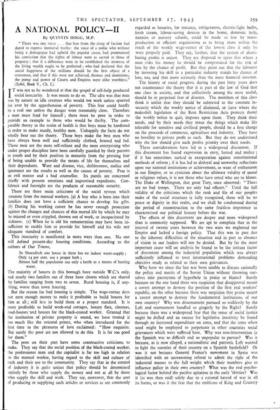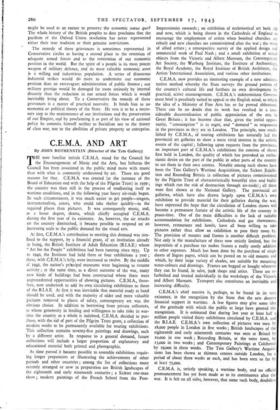A NATIONAL POLICY II
By QUINTIN NOGG, M.P.
" There was one voice . . that free from the slang of faction had dared to express immortal truths: the voice of a noble who without being a demagogue ha,c1 upheld the popular cause, had pronounced his conviction that the rights of labour were as sacred as those of property ; that if a difference were to be established the interests of the living wealth ought to be preferred ; who had declared that the social happiness of the millions should be the first object of a statesman, and that if this were not achieved, thrones and dominions, the pomp and power of Courts and Empires were alike worthless." (Sybil, Book V., Ch. I.).
IT was not to be wondered at that the gospel of self-help produced social insecurity. It was meant to do so. The idea was that man was by nature an idle creature who would not work unless spurred for ever by the apprehension of poverty. This fear could hardly be a real one unless the danger were reasonably dose. Therefore a man must fend for himself ; there must be poor in order to provide an example to those who would be thrifty. The com- parable theory in the realm of health is that boys must be hardened in order to make sturdy, healthy men. Unhappily the facts do not wholly bear out' the theory. Those boys make the best men who have always been well and sufficiently clothed, housed and fed. Those men are the most self-reliant and the most enterprising who under proper discipline have been carefully guarded by their parents in youth and by their position in maturity from the pressing fear of being unable to provide the means of life for themselves and their dependants. Want and disease, vice, shiftlessness, malice and ignorance are the results as well as the causes of poverty. Fear is an evil master and a bad counsellor. Its pupils are concerned chiefly with present emotions and improvised expedients. Con- fidence and foresight are the products of reasonable security.
There are three main criticisms of the social system which emanate from the manual workers. (a) A boy who is born into their families does not have a sufficient chance to develop his gifts. (b) During his working career he has never enough protection against the changes and chances of this mortal life by which he may be injured or even crippled, thrown out of work, or incapacitated by sickness. (c) When he is old his remuneration may have been in- sufficient to enable him to provide for himself and his wife any adequate standard of comfort.
This insecurity is manifested in more ways than one. No one will defend present-day housing conditions. According to the authors of Our Towns, In Shoreditch one house in three has no indoor water-supply ; Only 14 per cent. use a proper bath ; Almost half the population use only a kettle as a means of heating water.
The majority of houses in this borough have outside W.C.'s only, and nearly two families out of three have closets which are shared by families ranging from two to seven. Rural housing is, if any- thing, worse than town housing.
But the reason for bad housing is simple. The wage-earner does not earn enough money to make it profitable to build houses for him at all ; still less to build them at a proper standard. It is more profitable to build week-end cottages, luxury flats, cinemas, road-houses-and houses for the black-coated worker. Granted that the institution of. private property is sound, we have treated it too much like the oriental prince, who when introduced for the first time to the pleasures of love exclaimed: "How exquisite. But surely the poor are not allowed to do this. It is far too good for them."
The poor on their part have some constructive criticisms to make. They say that the social position of the black7coated worker, the professional man and the capitalist is far too high in relation to the manual worker, having regard to the skill and culture of each and their use to the community. They say that in the control of industry it is quite unjust that policy should be determined entirely by those who supply the money and not at all by those who supply the skill and work. They say, moreover, that the cost of producing or supplying such articles or services as are commonly regarded as luxuries, for instance, refrigerators, electric-light bulbs, fresh cream, labour-saving devices in the home, domestic help, nannies or nursery schools, could be made so low by mass- production or efficient organisation as to bring them within th‘t reach of the weekly wage-earner of the lowest class if only he were properly paid. They say, further, that the system of distri- buting profits is unjust. They are disposed to agree that where a man risks his money he should be compensated for the risk of loss by the chance of profit. But they point out that the labourer by investing his skill in a particular industry stands his chance of loss, too, and that more seriously than the mere financial investor.
The history of social progress during the past forty years does not countenance the theory that it is part of the law of God that one class in society, and that collectively among the most useful, should be in perpetual fear of disaster. The members of this class think it unfiir that they should be subjected to the constant in- security which the weekly notice of dismissal, or (save where the makeshift legislation of the Rent Restriction Acts protects them) the weekly notice to quit, imposes upon them. They think their needs, and by their needs they mean the things which make life tolerable for sensitive and civilised people, should be a first charge on the proceeds of commerce, agriculture and industry. They have no hostility to private profit as such. But they do not understand why the law should give such profits priority over their needs.
These considerations have led to a widespread discontent. If this discontent has found expression in envy, hatred and malice ; if it has sometimes turnzd in exasperation against constitutional methods of reform ; if it has led to disloyal and unworthy reflections upon our national institutions or achievement, to want of enthusiasm in our Empire, or to cynicism about the ultimate validity of moral or religious values, it is not those who have erred who are to blame. The Duke of Wellington, that great Tory, once observed: "There are no bad troops. There are only bad officers." Until the full validity of the criticisms which the rank and file of our peoples make of the social structure is fully recognised, there will be no peace or dignity in this realm, and we shall be condemned during the period of reconstruction to the same fruitless impotence as characterised our political history before the war.
The effects of this discontent are deeper and more widespread than is commonly supposed. We are apt to complain that in the interval of twenty years between the two wars we neglected our Empire and lacked a foreign policy. That this was in part due to the inherent difficulties of the situation and in part to absence of vision in our leaders will not be denied. But by far the most important cause will on analysis be found to be the irritant factor of discontent among the industrial population which was always sufficiently inflamed to treat international problems demanding objective study as related to their own grievances.
Why have we since the last war been unable to discuss rationally the policy and merits of the Soviet Union without throwing our- selves into paroxysms of hyperbole in praise or blame? Surely because on the one hand there was suspicion that disapproval meant a covert attempt to destroy the position of the first real workers' republic, on the other because there was suspicion that praise meant a covert attempt to destroy the fundamental institutions of our own country? Why was disarmament pursued so recklessly by the Left and rearmament handled so gingerly by the Right? Surely because there was a widespread fear that the sense of social justice might be dulled and an excuse for legislative inactivity be found through an increased expenditure on arms, and that the arms when used might be employed to perpetuate in other countries social grievances which were suffered here. Why was non-intervention in the Spanish war so difficult and so unpopular to pursue? Was it because, as is now alleged, a nationalistic and patriotic Left wanted to fight the enemies of their country on a Spanish battlefield? Or was it not because General Franco's movement in Spain was identified with an unreasoning refusal to admit the right of the industrial masses to the full weight which their numbers give to influence policy in their own country? What was the real psycho- logical factor behind the pacifist agitation in the early 'thirties? Was it (as was then said) solely due to a rational hatred of war in all its forms, or was it the fear that the emblems of King and Country might be used as an excuse to preserve the economic status quo? The whole history of the British peoples to date proclaims that the pacifism of the Oxford Union resolution has never represented either their true tradition or their genuine convictions.
The remedy of these grievances is sometimes represented in Conservative circles as having a second place to the retention of adequate armed forces and to the restoration of our economic position in the world. But the spirit of a people is its most potent weapon of military defence, and its most valuable economic asset is a willing and industrious population. A series of disastrous industrial strikes would do more to undermine our economic position than an extravagant administration of public finance ; our military prestige would be damaged far more seriously by internal disunity than the reduction in our armed forces which it would inevitably bring about. To a Conservative the remedy of these grievances is a matter of practical necessity. It binds him to no economic or political theory of the State. He sees it to be a neces- sary step to the maintenance of our institutions and the preservation of our Empire, and by proclaiming it as part of his view of national policy he commits himself neither to Socialism nor to the theory of class war, nor to the abolition of private property or enterprise.



























 Previous page
Previous page